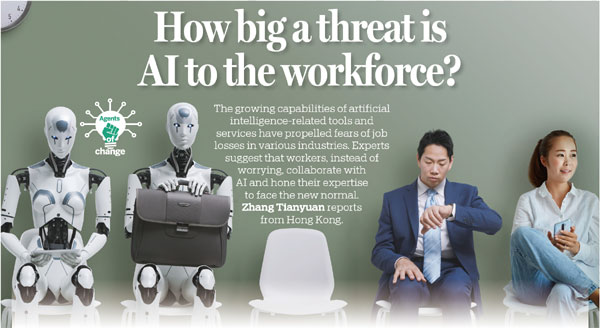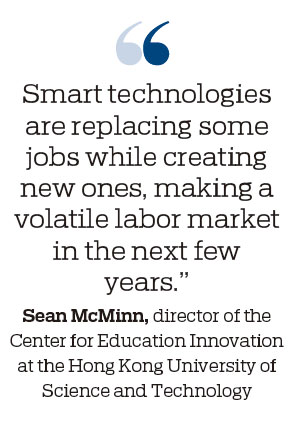
- Home
- Media Center
-
Events
- Wuzhen Summit
- Regional Forums
- Practice Cases of Jointly Building a Community with a Shared Future in Cyberspace
- World Internet Conference Awards for Pioneering Science and Technology
- The Light of Internet Expo
- Straight to Wuzhen Competition
- Global Youth Leadership Program
- WIC Distinguished Contribution Award
- Membership
- Research & Cooperation
- Digital Academy
-
Reports
- Collection of cases on Jointly Building a Community with a Shared Future in Cyberspace
- Collection of Shortlisted Achievements of World Internet Conference Awards for Pioneering Science and Technology
- Reports on Artificial Intelligence
- Reports on Cross—Border E—Commerce
- Reports on Data
- Outcomes of Think Tank Cooperation Program
- Series on Sovereignty in Cyberspace Theory and Practice
- Other Achievements
- About WIC
- 中文 | EN

How big a threat is AI to the workforce?
The growing capabilities of artificial intelligence-related tools and services have propelled fears of job losses in various industries. Experts suggest that workers, instead of worrying, collaborate with AI and hone their expertise to face the new normal. Zhang Tianyuan reports from Hong Kong.
'The programming barrier is incredibly low. We have closed the digital divide," said Jensen Huang, co-founder of the world's most valuable listed chipmaker, Nvidia Corp. "Everyone is a programmer now - you just have to say something to the computer."
At the Computex forum in Taiwan on May 29, Huang captivated a crowd of about 4,000 attendees by showcasing the company's latest artificial intelligence-related products and services. He demonstrated how programming can unlock creativity by asking an AI model to compose a piece of music that matched the early morning mood. With just a few lines of lyrics, the digital tool produced a song that left the audience in awe. "Everyone is a creator now," he said.
The growing capabilities of generative AI systems, such as ChatGPT (Generative Pre-trained Transformer) have inspired people to utilize them as virtual assistants to chat online with customers, release social media feeds, trade stocks, and write essays, proses or emails. Although these AI models are not yet capable of carrying out all the tasks expected of a full-fledged person, they outperform human brains in certain domains. This has sent shivers down the spines of various industries regarding employment.
BlueFocus - a major Chinese marketing agency - said in April it will replace its third-party human copywriters and designers with ChatGPT-like chatbots. This was followed by multinational tech company IBM Corp recently revealing plans to suspend hiring people for back-office functions, such as human resources, believing they can be replaced by AI.
The employment chill has reached the shores of Hong Kong. A survey conducted by the Hong Kong Wireless Technology Industry Association in the smartphone application industry showed that 73 percent of 157 local companies polled intended to adopt AI in their operations to reduce labor costs. The move would inevitably lead to job losses.
Many questions remain as to what extent AI applications could replace human analysis and creation, but research and facts suggest that ChatGPT and similar chatbots are raising the bar for entry-level jobs, making it harder for fresh graduates to find work.
According to a recent study conducted by Goldman Sachs, generative AI tools could potentially affect 300 million full-time jobs globally, leading to "significant disruptions" in the job market. The study highlights administration and legal work as being at the forefront of job replacement risks.
Entry positions in the administrative field, and legal industries such as paralegals and legal assistants, are responsible for consuming large amounts of information, synthesizing what they have learned and then making it digestible through a report or opinions.
Solicitor Christopher Wong Kwok-yan said in April that in the foreseeable future, each law firm in Hong Kong will need only half the workforce it currently employs, as chatbots have enabled legal professionals to expedite the processing of legal documents, such as contract drafting, which is normally done by junior lawyers.
The rise of smart technologies is forcing lawyers to specialize in specific areas in their profession, such as civil tort law and maritime law, as a means of securing their livelihoods. With legal knowledge becoming more accessible to the general public, lawyers must remain ahead of the curve by honing their expertise in niche fields, he said.
Soft skills matter
Competition for entry-level jobs is set to intensify, partly because generative AI systems bridge skill gaps for inexperienced professionals by offering desired outcomes with natural-language input, and partly because job opportunities will dwindle in certain traditional sectors digitized by advanced technologies. For most employers, demonstrated experience and AI proficiency could be the only way to access job applicants.
Hong Kong industry pundits say college students need to embrace AI where they can and leverage it while sharpening human judgment to avoid errors and biases associated with these technologies.
Sean McMinn, director of the Center for Education Innovation at the Hong Kong University of Science and Technology, said he expects human-AI collaboration and upskilling to be important subjects in job requirements for young generations.
"Smart technologies are replacing some jobs while creating new ones, making a volatile labor market in the next few years," McMinn said. "University students must adapt to using AI tools to tackle complex problems and generate ideas."
He said students must also hone their critical thinking and analytical skills to thrive in the ever-evolving job landscape. "Rather than simply focusing on knowledge retention and transfer, education institutions should help students develop skills for effective collaboration, leadership and adaptability in social systems.
"Universities should train students to analyze and identify problems, and approach them from a humanistic and contextualized perspective," McMinn added.
HKUST, the Chinese University of Hong Kong, and the Education University of Hong Kong have taken a proactive approach to ChatGPT adoption by allowing students to utilize such advanced technology in their coursework under oversight.
Roland Leung Tai-yin, co-founder of tech startup Datality Lab, pointed to the importance of maintaining and nurturing the next generation's human-interaction and communication skills, as excessive technology use may erode these essential abilities.
New opportunities emerge
In a recent interview, Secretary for Innovation, Technology and Industry Sun Dong said the Hong Kong Special Administrative Region government is committed to embracing emerging technologies, demonstrating a positive attitude toward ChatGPT.
As Microsoft brings enterprise-grade GPT capabilities to Hong Kong businesses, it reported that more than 80 percent of its enterprise clients in the city have shown interest in AI-based solutions. The US tech-giant investor of ChatGPT also opened AI-powered Bing AI Chat to the public in May.
The widening popularity of AI technologies in the private sector is a clear indication of the shift toward automation in Hong Kong's workforce. The predictions made in the Goldman Sachs report about AI replacing 30 percent of jobs in Hong Kong, mostly in finance and insurance sectors, are becoming real.
To address fears in the job market, Undersecretary for Innovation, Technology and Industry Lillian Cheong Man-lei said the HKSAR government offers individuals the Continuing Education Fund, and provides local enterprises with subsidies under the Reindustrialization and Technology Training Program to equip employees with advanced technologies such as ChatGPT in the AI era.
The Research Grants Council of the University Grants Committee had allocated HK$170 million ($21.7 million) to UGC-funded universities for AI research as of May 10, she said.
Calvin Tang Siu-fung, a member of China Retold and Beta Gamma Sigma, a business honor society, predicted that young people's employment choices in Hong Kong will diversify instead of concentrating on traditional advantageous sectors such as finance and law.
The advent of ChatGPT has reduced the cost of starting a business, making entrepreneurship a more attractive option for the city's young generation, Tang said. "This trend is expected to give rise to new industries in the city over the next three to five years, representing a significant opportunity for economic structure transformation in the international financial center."
Alan Chan Ching-tat, CEO and founder of AI-powered chat platform Omnichat, agreed. "The rise of ChatGPT empowers businesses to enhance work efficiency and provide better services to customers with AI, lowering operation costs in the long term." The company's product - Omni AI integrated with GPT-4 - can serve as retailers' digital sales assistants in handling customers' inquiries.
Chan said adopting AI has resulted in some job losses, but added that it has also created new job opportunities, particularly in areas that require skills in AI development and data analysis. "I believe ChatGPT will bring about a structural adjustment in the job market, acting as an intangible force that motivates people to transform their skills and focus on enhancing productivity."
The survey conducted by the Hong Kong Wireless Technology Industry Association showed that talent shortage in innovation and technology is a major challenge for mobile application developers intending to use AI, with about 60 percent of the firms interviewed holding the same view.
Entrepreneur Neo Kai Yuan has expanded the operations of his Singapore-based company, Rocket Academy, to Hong Kong in response to the surging demand for software engineers in the SAR. The company provides online coding training for people seeking to change their careers.
He said he believes that the demand for such occupations will continue to rise, and more people will be drawn toward the field.
Technological advancements create winners and losers. Government policies play a vital role in expanding access to new opportunities for firms and individuals and enhancing capabilities to face the challenges posed by technological revolution.
Ivan So, executive committee member of the Hong Kong Wireless Technology Industry Association, said he believes Hong Kong does not need to rush into AI legislation, as there are few formally open generative AI software programs available for use by local users, and their applications are slower compared with those overseas.
"Hasty legislation without sufficient understanding of related technologies and their development may result in frequent changes to the law and require unpredictable modifications," he warned.



The World Internet Conference (WIC) was established as an international organization on July 12, 2022, headquartered in Beijing, China. It was jointly initiated by Global System for Mobile Communication Association (GSMA), National Computer Network Emergency Response Technical Team/Coordination Center of China (CNCERT), China Internet Network Information Center (CNNIC), Alibaba Group, Tencent, and Zhijiang Lab.





